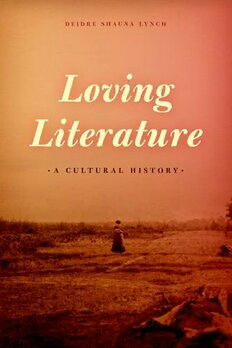
Loving Literature: A Cultural History PDF
Preview Loving Literature: A Cultural History
Loving Literature Loving Literature A Cultural History D e i D r e S h a u n a Ly n c h The university of chicago Press chicago and london deidre shauna lynch is the Chancellor Jackman Professor of English at the University of Toronto. The University of Chicago Press, Chicago 60637 The University of Chicago Press, Ltd., London © 2015 by The University of Chicago All rights reserved. Published 2015. Printed in the United States of America 24 23 22 21 20 19 18 17 16 15 1 2 3 4 5 isbn- 13: 978- 0- 226- 18370- 1 (cloth) isbn- 13: 978- 0- 226- 18384- 8 (e- book) doi: 10.7208/chicago/9780226183848.001.0001 The University of Chicago Press gratefully acknowledges the generous support of the Chancellor Jackman Professorship at the University of Toronto toward the publication of this book. Library of Congress Cataloging-in-Publication Data Lynch, Deidre, author. Loving literature : a cultural history / Deidre Shauna Lynch. pages cm Includes bibliographical references and index. isbn 978-0-226-18370-1 (cloth : alk. paper) — isbn 978-0-226-18384-8 (e-book) 1. English literature—Appreciation. 2. English literature—History and criticism. I. Title. pr129.u5l96 2015 820.9—dc23 2014015454 a This paper meets the requirements of ansi/niso z39.48– 1992 (Permanence of Paper). Contents List of Illustrations • vii Introduction: At Home in English • 1 part 1: choosing an author as you choose a friend 1 Making It Personal 21 part 2: possessive love 2 Literary History and the Man Who Loved Too Much 65 3 Wedded to Books: Nineteenth- Century Bookmen at Home 103 part 3: english literature for everyday use 4 Going Steady: Canons’ Clockwork 147 part 4: dead poets societies 5 Canon Love in Gothic Libraries 195 6 Poetry at Death’s Door 235 Acknowledgments • 277 Notes • 279 Index • 319 Illustrations 1.1 Frontispiece and title page from Select British Poets . . . (1824) 29 1.2 “Promissory Note . . . from Shakspeare” (1805) 43 1.3 “Apollo and the Muses, Inflicting Penance on Doctor Pomposo” (1783) (detail) 51 1.4 “The Ladies of Llangollen” (ca. 1887) 57 3.1 “The Pursuit of Letters” (1828–32) 133 3.2 Page from Mary Watson’s “The Scrap Book” (ca. 1821) 143 4.1 Frontispiece and title page from volume 2 of The Every- Day Book (1827) 164 5.1 Frontispiece from The Monks of St. Andrews . . . (ca. 1808– 27) 200 6.1 Frontispiece and title page from The Lives of the Most Famous English Poets (1687) 258 6.2 Illustration to Browning’s “Memorabilia” (1886) 265 6.3 Title page from A. W. Bennett’s edition of The Lady of the Lake (1865) 268 6.4 Frontispiece from Our English Lakes . . . (1864) 269 6.5 Wordsworth’s tomb from Our English Lakes . . . (1864) 271 Introduction at home in english Although since the era of Thomas Kuhn the natural sciences have inspired attempts to historicize their basic epistemological assumptions, research protocols, and social practices, we continue to await, Lorraine Daston has recently lamented, comparable self- reflection from and on behalf of human- ists: accounts of “what they do” and “how they know what they know.”1 In Loving Literature I aim to help English studies contribute to the project that Daston calls for. More precisely, I aim to suggest why self- reflection on our ways of knowing will not suffice when we seek to assess English pro- fessors’ characteristic mode of practicing humanist study: I aim to honor, instead, the central role that affective labor— our ways of feeling, then, as well as knowing—h as been assigned within English studies, and I aim to consider how through our cooperation with that assignment we have come to inhabit a profession that is paradoxically beholden to statements of per- sonal connection. Loving Literature turns to literary studies’ eighteenth- and nineteenth- century prehistory— to early definitions of literariness, to histo- ries of criticism, canonicity, literary history, and “heritage,” and, above all, to the emergence during this period of new etiquettes of literary appreci- ation— so as to examine how it has come to be that those of us for whom English is a line of work are also called upon to love literature and to ensure that others do so too. Following Max Weber, William Clark states that the “modern bureau- cratic distinction allowing the formation of a public- professional, expert self, and its insulation from the interests and hobbies of the amateur, pri- vate self, lies in the distinction between office and home.”2 The freewheeling
